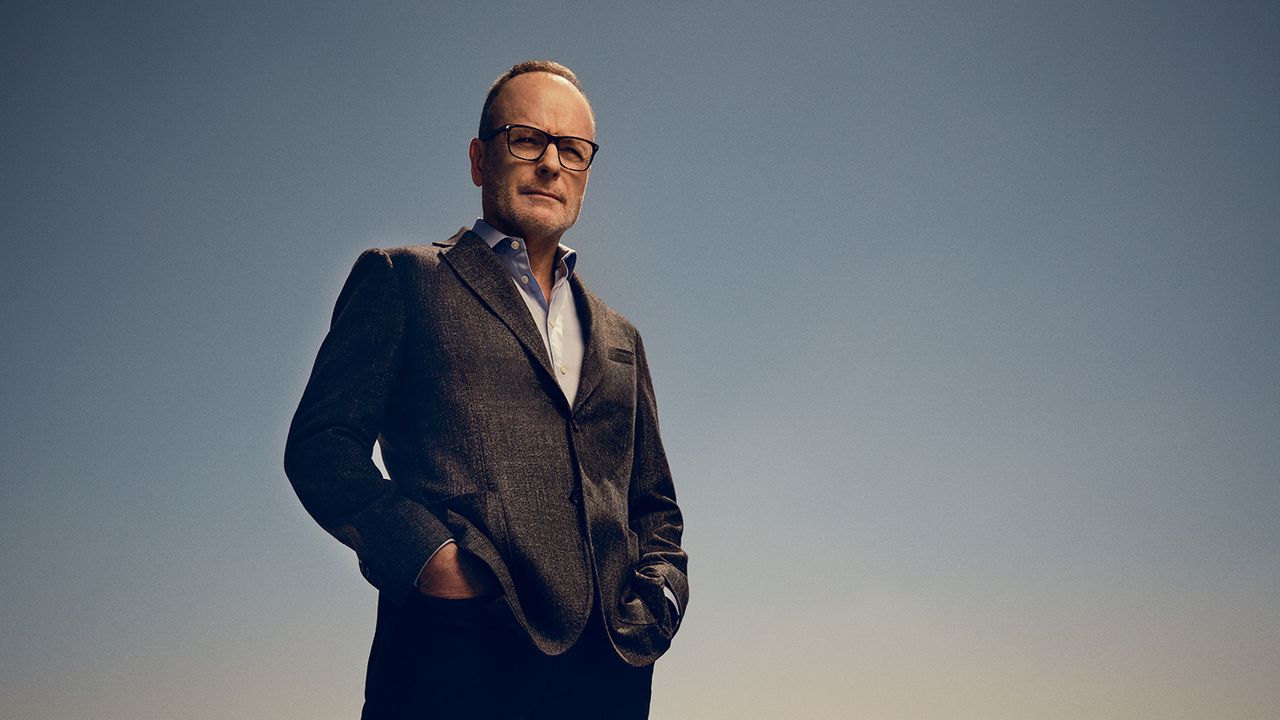When the cameras aren’t rolling, Storer whirls around the lot, weaving gracefully through bulky equipment and crew members. A perfect combo of chill
When the cameras aren’t rolling, Storer whirls around the lot, weaving gracefully through bulky equipment and crew members. A perfect combo of chill and exuberance, he constantly checks in with his cast. “Are you having fun?” Storer asks me at one point. “I mean, we have fun,” he says, nodding to the people scurrying around us, “but is it fun to watch?”
Ebon Moss-Bachrach, who plays Richie on the show, arrived early to observe his colleagues’ scenes. Remembering what it was like to film the first season during COVID, he says, “That’s part of why the show was so fun to make, and then so successful—the intimacy and proximity. I hadn’t been close to people in so long that it was nice to see people on top of each other.” Liza Colón-Zayas, who plays Tina, seconds this. Despite pandemic protocols, she says, “the chemistry from day one was enough.” Ricky Staffieri, who plays the comical Teddy Fak and is also a series coproducer, points to the mostly local Chicago crew and says, “The city gets behind us like crazy. On location, especially on days Jeremy’s there, it’s like the Beatles are coming.”
Storer and Senior say in their email about Landgraf and his team that they’ve learned over the course of the show that the most effective kitchens operate on trust. “John surrounds himself with people that he trusts,” they write, adding that the executives’ fingerprints are on every shot. “I think we take 99 percent of their notes/ideas? And vice versa. We’re on such a rushed production schedule, we can’t have any weirdness between us. The show would never make it on time.”
One of Landgraf’s favorite refrains is “It’s your vision, not mine.” According to Storer and Senior, “Any ideas or questions from John follow that philosophy; there’s always a push toward the vision. He doesn’t encourage us to take swings, he expects us to, which makes any sort of development process that much more clear because it protects the show from an easy or lazy solve.”
Landgraf describes his childhood as disjointed and solitary. His parents were itinerant evangelical musicians who both decided to get graduate degrees—and later a divorce. That made for a lot of moving around, which he believes fed his understanding of artists. “I really lived in a world of books and imagination and movies and television, and I always gravitated towards the artists and the nerds in school,” he says. “I found my people, and those are the same people that write television shows, act, and direct.”
Joel Fields, executive producer of FX’s The Americans, The Patient, and Fosse/Verdon, met Landgraf when Landgraf gave him a prospective student tour at Pitzer College. When I prod Fields for wild-oats-sowing tales—keg parties, bacchanalian nights—he shakes his head sadly. “If you want the dirt…he played the flute. Does that tell you what you need to know?”
After studying anthropology, Landgraf did a fellowship in political science and pursued a master’s in public policy. He never imagined himself working in the entertainment industry, but an internship shifted his career path. Six years at a production company led to a large leap: a gig as the vice president of NBC prime-time series during the network’s Must-See TV golden years, overseeing classics like The West Wing, Friends, and ER. A stint at Jersey Films followed, but Landgraf was increasingly convinced that the television business was broken.
“I didn’t feel I could protect the creative,” he says. “Writers have something they want to say, and I felt that in the commercial process—the sausage factory—most of that gets jettisoned in favor of: We need it to be paced like this and we don’t want to offend this person, and whatever other compromises you make along the way.” And the thing that gets lost? “It’s actually the animating spirit that makes great movies and great television.”
In 2003 Landgraf got a call asking if he’d be interested in working at a basic-cable network called FX. Launched by Rupert Murdoch’s News Corp., it had been a dowdy home for reruns until 2000, when an HBO marketing exec named Peter Liguori joined forces with Kevin Reilly, who’d helped bring The Sopranos into the world. Together they reconceived FX as a “free HBO” and proved their daring with two original series: The Shield, a raw ride-along with corrupt LA cops, and the plastic surgery dramedy Nip/Tuck. The Shield became the highest-rated basic-cable debut of its time; its star, Michael Chiklis, beat out West Wing’s Martin Sheen and Six Feet Under’s Michael C. Hall for the best-actor Emmy that first year. Nip/Tuck further whipped up excitement for the fledgling FX slate, introducing the wider world to a showrunner named Ryan Murphy.

COMMENTS